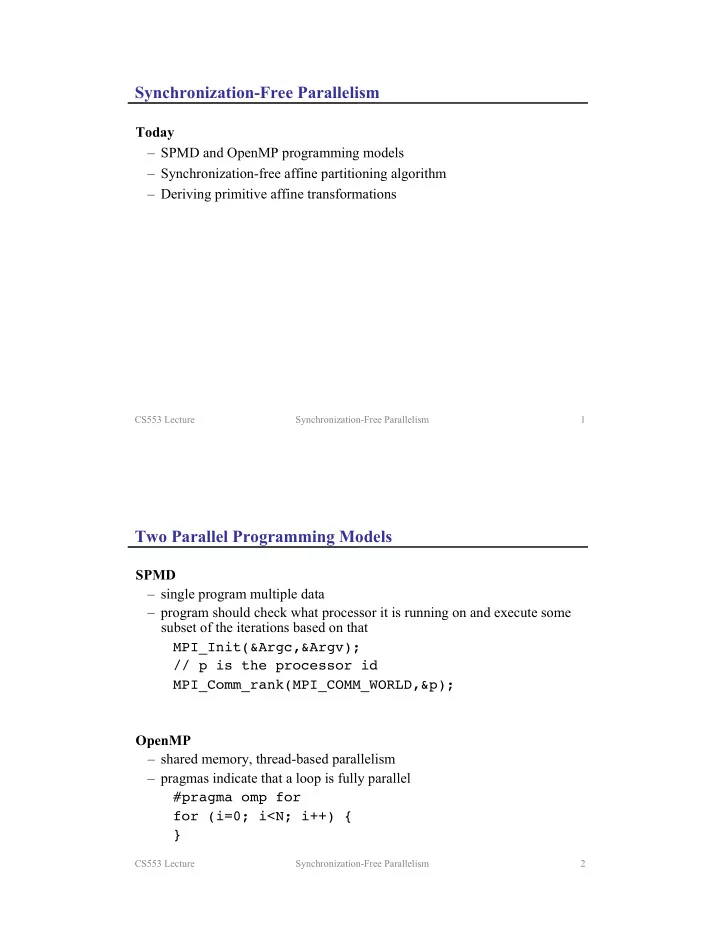

Synchronization-Free Parallelism � Today – � SPMD and OpenMP programming models – � Synchronization-free affine partitioning algorithm – � Deriving primitive affine transformations CS553 Lecture Synchronization-Free Parallelism 1 Two Parallel Programming Models � SPMD – � single program multiple data – � program should check what processor it is running on and execute some subset of the iterations based on that MPI_Init(&Argc,&Argv); � // p is the processor id � MPI_Comm_rank(MPI_COMM_WORLD,&p); � � OpenMP – � shared memory, thread-based parallelism – � pragmas indicate that a loop is fully parallel #pragma omp for � for (i=0; i<N; i++) { � } � CS553 Lecture Synchronization-Free Parallelism 2
Diagonal Partitioning Example � Example � do i = 1,6 do j = 1, 5 � A(i,j) = A(i-1,j-1)+1 � enddo � � enddo j i � Goal – � Determine an affine space partitioning that results in no synchronization needed between processors. CS553 Lecture Synchronization-Free Parallelism 3 Space-Partition Constraints � Accesses sharing a dependence should be mapped to the same processor read : A ( i ′ − 1 , j ′ − 1) – � loop bounds write : A ( i, j ) , 1 ≤ i, i ′ ≤ 6 1 ≤ j, j ′ ≤ 5 – � equality constraints on dependence – � equality constraints on space partition CS553 Lecture Synchronization-Free Parallelism 4
Solving the Space-Partition Constraints � Ad-hoc approach – � Reduce the number of unknowns – � Simplify – � Determine independent solutions for space partition matrix – � Find constant terms (would like min of mapping to be non-negative) CS553 Lecture Synchronization-Free Parallelism 5 Generate Simple Code � Algorithm 11.45 Generate code that executes partitions of a program sequentially – � for each statement, project out all loop index variables from the system with original loop bounds and space partition constraints – � use FM-based code gen algorithm to determine bounds over partitions – � not needed for example – � union the partition bounds over all statements – � not needed for example – � insert space partition predicate before each statement � do p = 0, 9 � do i = 1,6 � do j = 1, 5 if (i-j+4 = p) A(i,j) = A(i-1,j-1)+1 � CS553 Lecture Synchronization-Free Parallelism 6
Eliminate Empty Iterations � Apply FM-based code generation algorithm to resulting iteration space – � for each statement – � use unioned p bounds, the statement iteration space and the space partition constraints – � determine new bounds for the statement iteration space – � union the iteration space for all statements in the same loop – � For example, did this when determining bounds on p � do p = 0, 9 � do i = max(1,-3+p), min(6,p+1) � do j = max(1,i+4-p), min(5,i+4-p) � if (i-j+4 = p) A(i,j) = A(i-1,j-1)+1 CS553 Lecture Synchronization-Free Parallelism 7 Eliminate Tests from Innermost Loops � General approach: apply the following repeatedly – � select an inner loop with statements with different bounds – � split the loop using a condition that causes a statement to be in only one of the splits – � generate code for the split iteration spaces � do p = 0, 9 � do i = max(1,-3+p), min(6,p+1) � do j = max(1,i+4-p), min(5,i+4-p) � A(i,j) = A(i-1,j-1)+1 CS553 Lecture Synchronization-Free Parallelism 8
Using the Two Programming Models � SPMD and MPI MPI_Comm_rank(MPI_COMM_WORLD,&p); � for (i = max(1,-3+p); i<= min(6,p+1); i++) � � for (j = max(1,i+4-p); j<=min(5,i+4-p); j++) � � A[i][j] = A[i-1][j-1]+1 � � OpenMP � #pragma omp for � for (p = 0; p<=9; p++) � for (i = max(1,-3+p); i<=min(6,p+1); i++) � for (j = max(1,i+4-p); j<= min(5,i+4-p); j++) � A[i][j] = A[i-1][j-1]+1 � CS553 Lecture Synchronization-Free Parallelism 9 Derive Re-indexing by using Space Partition Constraints � Source Code � for (i=1; i<=N; i++) { � � Y[i] = Z[i]; /* s1 */ � � X[i] = Y[i-1]; /* s2 */ � � } � � Transformed Code � if (N>=1) X[1]=Y[0]; � � for (p=1; p<=N-1; p++) { � � Y[p] = Z[p]; � � X[p+1]=Y[p]; � � } � � if (N>=1) Y[N] = Z[N]; � CS553 Lecture Synchronization-Free Parallelism 10
Concepts � Two Parallel Programming Models – � SPMD – � OpenMP � Deriving a Synchronization-Free Affine Partitioning – � setting up the space partition constraints (keep iterations involved in a dependence on the same processor) – � solve the sparse partition constraints (linear algebra) – � eliminate empty iterations (Fourier-Motzkin) – � eliminate tests from inner loop (more Fourier-Motzkin) – � using the above to derive primitive affine transformations CS553 Lecture Synchronization-Free Parallelism 11 Next Time � Lecture – � Tiling! � Suggested Exercises – � Be able to derive the synchronization-free affine partitioning for Example 11.41 in the book. – � Show how the other primitive affine transformations are derived. CS553 Lecture Synchronization-Free Parallelism 12
Recommend
More recommend